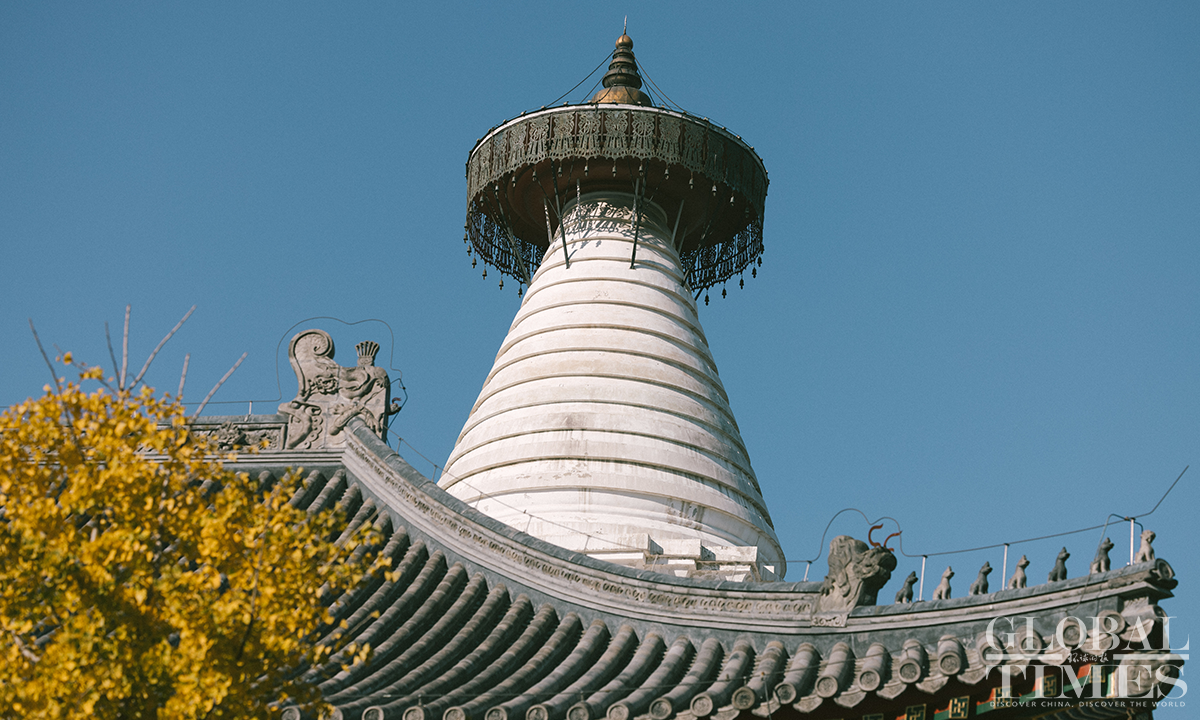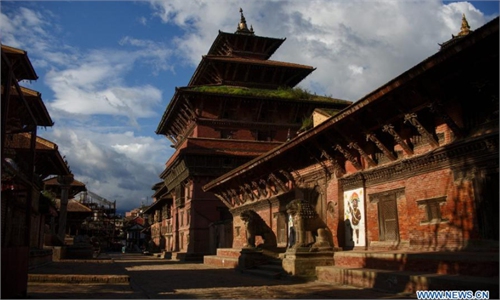IN-DEPTH / IN-DEPTH
Chinese investors welcome to explore opportunities in Nepal's tourism industry: diplomat

The photo taken on August 7, 2020 shows the Patan Durbar Square after rain in Lalitpur, Nepal. Photo: Xinhua
The 67th anniversary of the establishment of diplomatic ties between China and Nepal is a great occasion to highlight the friendly relations between the two countries, and this is also the right time to organize tourism and cultural activities and promotional events to strengthen cultural relations, Chhabindra Parajuli, economic minister with the Embassy of Nepal in China, told the Global Times in an exclusive interview.
"Nepal has immense resources and a viable investment-friendly environment, so it could become a destination of choice for investors from China. In the context of the rapid pace of globalization and regionalism, Nepal and China can cooperate on various fronts," Parajuli noted.
According to Parajuli, tourism could be a key area that both countries can partner in, as tourism has become one of the most powerful and largest industries in the global economy.

Chhabindra Parajuli Photo: Courtesy of Chhabindra Parajuli
"The industrial prospects and economic role of tourism in social, cultural and economic dynamics have increased. Ranging from culture to tourism, the industry has become the backbone of the national economy as well as the global economy. Recent technological advancements have made the tourism service trade more dynamic and vibrant. The tourism sector plays a vital role in transforming economic status, promoting industrial transformation and upgrading. Policies in relation to tourism also contribute to achieving a wider range of national, regional and global objectives, including sustainable development goals (SDGs)," he said.
The number of Chinese tourists visiting Nepal has increased rapidly in recent years. The economic minister also noted that tourism has become an important pillar of people-to-people relations between the two countries, which further promotes the development of bilateral ties.
"From adventure treks under the shadows of the jaw-dropping Himalayas to the low-lands, and from an amazing amalgam of ethnic, language and cultural diversity to the roots of ancient civilization, Nepal has many things on offer for tourists. Therefore, I would like to ask all Chinese tourists to visit Nepal for a wonderful experience," he said.
Historical bonds, business opportunities
One of the first foreign travelers to Nepal was the Chinese traveler and philosopher Huen Tsang, who can also be seen as the first Chinese tourist to visit Nepal.
The renowned Nepali architect Arniko travelled to China via China's Xizang Autonomous Region. Amiko designed and constructed temples with pagodas in various different places in China. One of them is the famous White Dagoba Temple in Beijing which is now a popular tourist site.
"The White Dagoba Temple is a historical symbol of long-lasting Nepal-China friendship. The significance of this heritage is unparalleled. People of the two neighboring countries were travailing back and forth from this early period," Parajuli said.

The White Dagoba Temple in Beijing Photo: Li Hao/GT
"Since Nepal has liberal investment and economic policies, Chinese investors should explore these opportunities by investing in the tourism industry. There are more opportunities in tourism sector investment activities for Chinese investors since Nepal is home to natural beauty, cultural diversity, high mountains and scenic lakes, diverse ethnic people and their cultures, year-round festivals and welcoming people," he added.
"Nepal is waiting to welcome Chinese tourists as well as Chinese investors in tourism infrastructure development projects," the economic minster said.
Parajuli explained that the tourism sector enjoys comparative advantages and has high potential for development, which can support the Nepali economy.
Nepal is home to the world's highest mountain range, which includes eight of the world's 10 tallest mountains. It is also a magnet for the world's most avid mountaineers, rock climbers, trekkers, and adventure seekers.
"The Constitution of Nepal incorporates policies for developing tourism as a key driver of the national economy by developing these places as tourist destinations. Since tourism has made a significant contribution toward achieving the goal of economic prosperity by enhancing employment opportunities, reducing poverty, and improving people's living standards, this sector can be seen as an attractive sector for foreign investment," he said.
Parajuli told the Global Times that there are many opportunities in developing tourism infra-structure, such as hotels, restaurants, roads, airports, cable cars, children's parks, urban green parks and other facilities.
"There are more opportunities for mountain tours and to develop new tourism destination points and also new tourism products and establishing marketing networks," he added.
There is also great potential for expanding the market for meetings, international conferences and events (MICE).
Plans to build a new international airport are already underway, which will also open new avenues for Chinese investment in the tourism industry. Local authorities are also seeking expansion of existing tourism products and introduction of new and innovative products with a view to attracting different types of tourists.
As of mid-March of 2021, there are 27 international airlines operating in Nepal, which has bilateral air service agreements with 40 countries.
Currently, Air China, China Southern Airlines, Nepal Airlines and Himalaya Airlines are operating flights connecting Nepal with various cities in China.
"China has a growing middle-class population and it is seeing a rapid expansion in tourism, so the flow of Chinese tourists to Nepal will increase," Parajuli said.
The Chinese Mountaineering Association (CMO), International Mountain Tourism Alliance (IMTA) and China Adventure Association (CAA) are expected to work together with Nepal tourism related organizations and institutions to promote awareness of tourism opportunities in both countries.
Nepal has also made arrangements to attract Chinese tourists. For instance, visas are available on arrival for Chinese travelers, with visa fees fully waived. Nepal and China have signed the Air Service Agreement and a Memorandum of Understanding (MoU) and the Chinese yuan has been made convertible for tourists and business travelers.
"China is the fastest growing source market for Nepali tourism. I would like to ask all Chinese tourists to visit Nepal and have a chance to witness our natural beauty, culture and adventure," he said.

